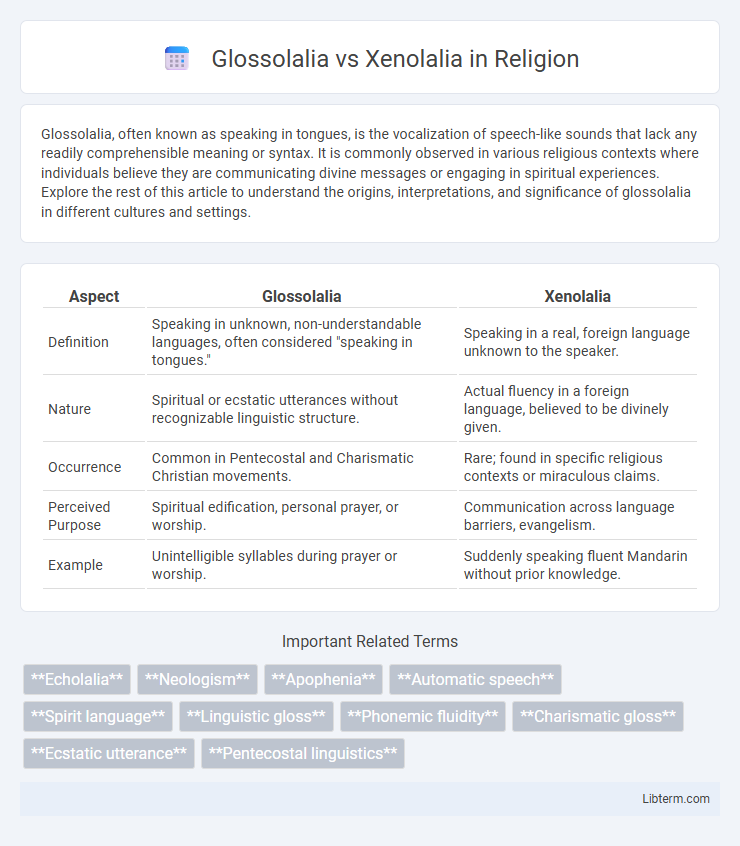Glossolalia, often known as speaking in tongues, is the vocalization of speech-like sounds that lack any readily comprehensible meaning or syntax. It is commonly observed in various religious contexts where individuals believe they are communicating divine messages or engaging in spiritual experiences. Explore the rest of this article to understand the origins, interpretations, and significance of glossolalia in different cultures and settings.
Table of Comparison
| Aspect | Glossolalia | Xenolalia |
|---|---|---|
| Definition | Speaking in unknown, non-understandable languages, often considered "speaking in tongues." | Speaking in a real, foreign language unknown to the speaker. |
| Nature | Spiritual or ecstatic utterances without recognizable linguistic structure. | Actual fluency in a foreign language, believed to be divinely given. |
| Occurrence | Common in Pentecostal and Charismatic Christian movements. | Rare; found in specific religious contexts or miraculous claims. |
| Perceived Purpose | Spiritual edification, personal prayer, or worship. | Communication across language barriers, evangelism. |
| Example | Unintelligible syllables during prayer or worship. | Suddenly speaking fluent Mandarin without prior knowledge. |
Introduction to Glossolalia and Xenolalia
Glossolalia refers to the phenomenon of speaking in tongues, where individuals produce speech-like sounds that lack any comprehensible meaning, often observed in religious or spiritual contexts. Xenolalia, distinguished from glossolalia, involves speaking in a previously unknown real language without prior learning, typically considered miraculous or supernatural. Both phenomena highlight diverse aspects of human language expression and transcend ordinary linguistic abilities.
Defining Glossolalia: Speaking in Tongues
Glossolalia, commonly known as speaking in tongues, is a phenomenon where individuals produce speech-like sounds that lack recognizable meaning or structure within any known language, often occurring during religious or ecstatic experiences. This differs from xenolalia, which involves speaking fluently in a foreign language previously unknown to the speaker. Glossolalia is primarily characterized by its spontaneous vocalization and spiritual significance rather than intelligibility or linguistic comprehension.
Understanding Xenolalia: Speaking in Known Languages
Xenolalia refers to the phenomenon of speaking in actual, known foreign languages without prior learning, often reported in religious or spiritual contexts. Unlike glossolalia, which involves speaking in unintelligible, non-structured sounds or "tongues," xenolalia consists of coherent speech in real languages that the speaker has never studied. Understanding xenolalia requires examining its linguistic characteristics and cultural significance, as well as documented instances where individuals spontaneously articulate foreign languages fluently during trance or ecstatic states.
Historical Origins of Glossolalia and Xenolalia
Glossolalia, historically traced back to early Christian Pentecostal movements in the 1st century AD, is characterized by speech-like but unintelligible sounds believed to be a divine language. Xenolalia, distinct from glossolalia, refers to the ability to speak and understand actual foreign languages without prior learning, documented in rare Pentecostal and Charismatic phenomena especially from the 20th century onward. The historical origins of glossolalia are deeply rooted in religious texts like the New Testament, while xenolalia's emergence as a recognized concept is more recent and primarily associated with modern spiritual revivalism.
Linguistic Features: Glossolalia vs Xenolalia
Glossolalia involves the spontaneous production of speech-like sounds that lack recognizable linguistic structure, grammar, or vocabulary, often characterized by repetitive phonemes without semantic meaning. Xenolalia, by contrast, refers to the purported ability to speak an actual foreign language unknown to the speaker, exhibiting coherent syntax, grammar, and vocabulary consistent with that language. Linguistically, glossolalia is marked by non-referential vocalizations without identifiable linguistic rules, whereas xenolalia demonstrates fluency and accurate linguistic features of an existing language.
Psychological Perspectives and Interpretations
Glossolalia involves uttering speech-like sounds without known linguistic meaning, often interpreted psychologically as a manifestation of altered states of consciousness or a coping mechanism during spiritual experiences. Xenolalia, characterized by sudden fluency in an unfamiliar language, challenges cognitive and neurological frameworks, raising questions about subconscious memory retrieval or dissociative phenomena. Psychological studies emphasize glossolalia's role in emotional regulation and social bonding, whereas xenolalia remains less understood, sparking debates on its cognitive and neuropsychological validity.
Theological Significance in Christianity
Glossolalia, or speaking in tongues, is often seen in Pentecostal and Charismatic Christianity as a spiritual gift symbolizing the Holy Spirit's presence and empowerment, fostering personal edification and communal worship. Xenolalia, the phenomenon of speaking real foreign languages unknown to the speaker, is regarded as a miraculous sign validating divine intervention and facilitating missionary work by enabling communication across linguistic barriers. Theologically, glossolalia emphasizes internal spiritual experience and unity within the church body, while xenolalia underscores outward missionary mandate and the expansion of the Gospel to diverse cultures.
Glossolalia and Xenolalia in Modern Worship
Glossolalia, commonly known as speaking in tongues, involves uttering speech-like sounds without known linguistic meaning and is widely practiced in Pentecostal and Charismatic worship to express spiritual experience and divine inspiration. Xenolalia, by contrast, is characterized by the miraculous ability to speak and understand actual foreign languages unknown to the speaker, though it is far less frequently documented or experienced in contemporary worship settings. Modern worship predominantly emphasizes glossolalia for personal edification and communal spiritual empowerment, with theological debates focusing on its biblical authenticity and experiential significance.
Scientific Studies and Controversies
Glossolalia, commonly known as speaking in tongues, has been studied extensively within psychology and neuroscience, revealing activation in brain regions associated with language production and emotional expression but lacking semantic coherence. In contrast, xenolalia involves purportedly speaking a foreign language unknown to the speaker, with scarce empirical evidence or scientific validation supporting its occurrence, leading to ongoing skepticism and debate. Controversies center on the neurological basis and authenticity of these phenomena, with critics questioning methodological rigor and proponents arguing for spiritual or paranormal interpretations.
Conclusion: Comparing Glossolalia and Xenolalia
Glossolalia involves speaking in an unknown language that is typically unintelligible to others, often seen in religious or spiritual contexts. Xenolalia refers to the spontaneous ability to speak a real foreign language without prior learning, which is far rarer and often claims supernatural or mystical origins. Comparing both, glossolalia is more common and symbolic, while xenolalia is characterized by its direct communication in an actual existing language.
Glossolalia Infographic

 libterm.com
libterm.com